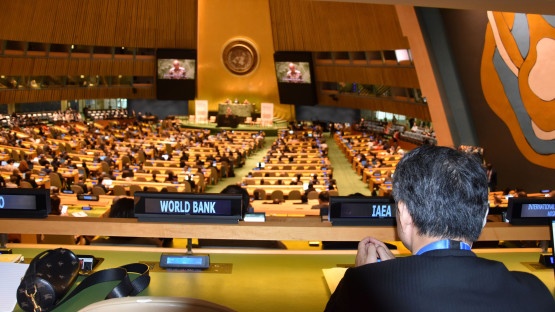The IAEA participated in the 2023 United Nations High-Level Political Forum at UN Headquarters in New York from 10 – 19 July, emphasizing the critical contributions made by nuclear science and technology towards the achievement of the Sustainable Development Goals (SDGs).
“We face an uncertain future at a time of converging water, energy and climate crises. We must work together to find viable solutions to address countries’ priorities, increase their resilience, and reduce global inequalities,” IAEA Deputy Director General and Head of the Department of Technical Cooperation Hua Liu said.
The IAEA is focused on helping countries to reach their SDGs targets, and the 2023 High-Level Political Forum featured in-depth reviews of five SDGs, including clean water and sanitation (SDG 6) and affordable and clean energy (SDG 7). The IAEA promotes the use of nuclear science and technology to create clean, reliable and affordable energy and the use of nuclear techniques, such as isotope hydrology, to increase water security.
This year marks the midpoint for the implementation of the 17 SDGs, interconnected goals intended to address the global challenges the world is facing, with the aim of achieving these goals by 2030. The forum is an opportunity to assess what has been achieved and what is needed, ahead of the upcoming SDG Summit at the UN General Assembly in September.
The IAEA participated in plenary sessions, hosted an exhibition and organized a side event that focused on improving access to clean water and energy through South-South and triangular cooperation. The event provided a platform for Member States and UN organizations to engage in substantive and constructive discussions.
In her opening remarks, United Nations Office for South-South Cooperation Director Dima Al-Khatib underscored the importance of this approach. “South-South and triangular cooperation is proving itself as an innovative way of enhancing capacity and alleviating the challenges countries of the South are grappling with – be they water management, energy, digitalization, or poverty. South-South cooperation is an invaluable collaborative mechanism with impact at all levels,” she said.
Ambassador Xolisa Mabhongo of South Africa emphasized the importance of South-South cooperation in energy planning due to the high level of technical competency required. With the support of the IAEA, South Africa has hosted several sessions of the Nuclear Energy Management School, to help experts from African countries to build their knowledge and skills on the nuclear energy life cycle.









